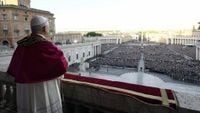The campus of Villanova University is buzzing with excitement following the election of Robert Prevost as Pope Léon XIV on May 8, 2025. This marks a historic moment, as Prevost becomes the first American to ascend to the papacy, a fact that has prompted celebrations among students and faculty alike.
Prevost, affectionately known as "père Bob" by his peers, is a product of Villanova, where he studied mathematics and was significantly influenced by the teachings of Saint Augustine. The university, founded in 1842 by Irish Catholics, has a rich tradition of Augustinian education, making Prevost's election particularly poignant for its community.
Amelia Weiss, a 19-year-old biochemistry student, shared her elation, recounting, "I was in my dorm room with the door open, and suddenly I heard everyone start to scream. We were there saying, 'The new pope is from Villanova!' Everyone's been talking about it since. The math students were on cloud nine!" This sentiment reflects the pride felt by many at the university, who view Prevost not just as a leader of the Catholic Church but as one of their own.
Robert Prevost, originally from Chicago, has always been deeply connected to the Augustinian values that Villanova promotes. He studied the works of Saint Augustine, including "The City of God" and "Confessions," which have shaped his philosophical and theological outlook. According to Reverend Rob Hagan, a long-time mentor of Prevost, the new pope is incredibly intelligent, talented, and multilingual. Hagan expressed his joy, stating, "We were stunned. I mean, it was a complete surprise. There was joy, tears; I was in a trance because for us, he is Bob, he is our Augustinian brother. We are so happy to see the rest of the world get to know him too."
At Villanova, all students are required to engage with Saint Augustine's texts, a practice that Reverend Hagan believes is essential in today's fast-paced world. "We are tempted, we are distracted, we are drawn to so many things that we think will satisfy us—like the internet, power, ambition, sex. Saint Augustine speaks to us because he was a sinner before he became a saint. He made the mistakes we make, and that students make too," he explained.
Will Kelly, a contemporary American history student, reflected on the profound impact of reading Augustine's works, noting, "It's an ancient text, but it remains relevant. It addresses my everyday life." Kelly emphasized that the teachings on campus are not politically motivated but rather a shared quest for truth among students.
Jaisy Joseph, a specialist in Saint Augustine at the university's theology department, hopes that Pope Léon XIV will utilize his Augustinian teachings to transform the Catholic Church. She remarked, "At this university, as with Saint Augustine, there is recognition that as individuals, we have a limited perception of truth, and we need our friends, our fellow pilgrims. We may have different viewpoints, but we will not fight against each other; rather, we will seek the truth together, side by side."
Joseph highlighted a phrase that resonates with many students: "Become what you are not yet." This quote encapsulates the journey of self-discovery and growth that is encouraged at Villanova, reflecting the university's commitment to fostering a community of learners.
The election of Pope Léon XIV is also viewed through a broader lens, as philosopher Thibaut de Saint Maurice articulated in a recent discussion. He posited that the election is significant not only for Catholics but also for believers of other faiths and even for non-believers. He argued that it represents a moment of political significance, as it showcases a community selecting a leader, albeit one with limited political power compared to a traditional head of state.
De Saint Maurice emphasized that the election of the pope is a chance to rethink what we consider "politics" in today's world. He noted, "Given the crisis democracy is facing today in France, Europe, the United States, and everywhere else, we cannot afford to overlook the relationship between politics and the delegation of power." He invoked the thoughts of philosopher Hannah Arendt, who suggested that our understanding of power often conflates it with domination. Instead, he urged a view of power as collective action, highlighting that the new pope's authority hinges on the consent of those who recognize him.
"The pope does not have power over non-believers, and for Catholics, his power is only legitimate as long as they choose to recognize it," he stated. This perspective opens a dialogue about the nature of authority and governance, questioning whether the pope's role could inspire a more authentic form of leadership that values consent and recognition.
As the Villanova community celebrates its connection to Pope Léon XIV, the implications of his election extend far beyond the university's campus. It presents an opportunity for reflection on leadership, authority, and the collective journey toward truth, resonating with both believers and non-believers alike. The excitement surrounding Prevost's ascension is palpable, and it serves as a reminder of the enduring power of shared values and the quest for understanding in an increasingly complex world.




